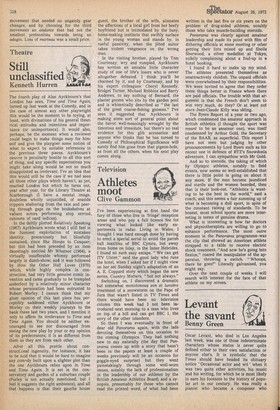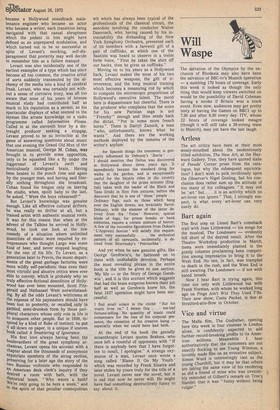Levant the savant
Benny Green
Oscar Levant, who died in Los Angeles last week, was one of those indeterminate characters whose status is never quite defined either to their own satisfaction or anyone else's. It is symbolic that the Times should have headed its obituary notice 'Occasional actor and wit' when it was two quite other activities, his music and his writing, for which he is most likely to earn his footnote to the history of popular art in our century. He was really a pianist who became a composer who became a Hollywood soundtrack maintenance engineer who became an actor Who became a writer, each transition being navigated with that casual abruptness Which the pedant in him might have .defined as an unprepared modulation, and which turned out to be so successful in spite of Levant's mocking, self-disparagement that posterity may well decide to remember him as a failure manqué.
Levant was also incidentally one of the earliest examples of a type which has since become all too common, the creative artist of sorts suddenly transmuted by the alchemy of the media into a kind of cerebral freak. Levant, who was certainly not without a sense of corrosive irony, was all too aware that none of his years of intense musical study had contributed half as much to his reputation as a savant, as his Spectacular displays of what seemed to the layman like arcane knowledge on a radio programme called Information Please. Called in at the eleventh hour by a distraught producer seeking a stopgap, Levant proved to be so invincible at the game of answering questions about music that one evening the Grand Old Man of the American musical, George M. Cohan, was brought in to provide some opposition, only to be squashed like a fly under the juggernaut of Levant's swift and meticulously catalogued brain. Having been beaten to the punch time and again by the younger man, and having said literally nothing throughout the broadcast, Cohan found his tongue only on leaving the studio, when, spoilt baby to the last, he asked, "Were the boys rehearsed?"
But Levant's knowledge was genuine enough. Like all effective cultural drifters, he was really no drifter at all, but a trained artist with authentic musical roots. It was for this reason that when at the advent of the Talkies he arrived in Hollywood, he took one look at the low comedy of a situation where unlimited quantities of music were required by entrepreneurs who thought Largo was some kind of beer, and never stopped laughing for the rest of his life. To Levant, as a generation later to Previn, the music departments of the great garbage factories were more wildly self-parodistic than even their most vitriolic and abusive critics were ever able to convey, which is probably why no truly effective fictional demolition of Hollywood has ever been mounted, Scott Fitzgerald and Nathanael West notwithstanding. By all the odds Levant's witticisms at the expense of his paymasters should havebeen lost to posterity, or recalled only in garbled, semi-drunken form by those peripheral characters whose only role in life is to misquote other people. But in 1939, inspired by by a kind of fluke of instinct, he put it all down on paper, in a unique if uneven book called A Smattering of Ignorance. His first love always having been the boulevardiers of the great symphony orchestras, Levant opens his account with a Chapter about the thousands of anonymous expatriate members of the string section, Preserving for a later age the story of the two Russian violinists who responded to an American desk clerk's inquiry if they desired a room with bath, with the rhetorical bomb, "Who wants a bath? We're only going to be here a week," and in the spirit of that peculiar cosmopolitan
wit which has always been typical of the professionals of the classical circuit, the anecdote involving the conductor Walter Damrosch, who, having caused by his intractability the disbanding of the New York Symphony Orchestra, presented each of its members with a farewell gift of a pair of cufflinks, at which one of the flautists was heard to observe in a treble forte voice, " First he takes the shirt off our backs, then he gives us cufflinks."
Moving on to his years as a Hollywood hack, Levant makes the most of his two most effective weapons, the gift of irreverence, and the long musical training which becomes a measuring rod by which to compute the microscopic proportions of Hollywood's executive talent. The mood here is dispassionate but cheerful. There is the producer who complains that the score for his new Parisian saga is not " Frenchy " enough and then sends back the dictat, " Put in some more french horns ". There is Darryl Zanuck, a man "who, unfortunately, knows What he wants ". And there are the working methods deployed by the inmates of the writer's asylum:
. . for Spanish things the treatment is generally influenced by Debussy's ' Iberia ' . . . I should mention that Delius was discovered in Hollywood about three years ago. It immediately became the standard thing for walks in the garden, and is exceptionally useful for the bicycle rides in the country that the daughter of the prime minister (English) takes with the leader of the Black and Tans (Irish) in Sinn Fein pictures, before she discovers that he is one of ' those ' people . . . Ordinary fogs, such as those which hang over the English downs, are invariably RavelDebussy, with the element of the latter derived from his 'Fetes.' However, special kinds of fogs, for prison breaks or bank robberies, require a certain mixture of horror. A few of the recondite figurations from Dukas's L'Apprenti Sorcier ' will satisfy this requirement very successfully . . . the orchestral pattern of all carousels, incidentally, is derived from Stravinsky's Petrouchka
And yet when he saw genuine gifts, like George Gershwin's, he battened on to them with unshakable devotion. Perhaps the most revealing phrase in the entire book is the title he gives to one section: 'My life — or the Story of George Gershwin ', and it is this account which suggests that had the brain surgeons known their job half as well as Gershwin knew his, the fatal 1937 operation might have been successful:
I find small solace in the cliché: "But his music lives on." I detest this . . . tea-leaf fortune-telling. No quantity of music could compensate for the loss of his corporal presence, the cessation of his creative being — especially when we' could have had both.
At the end of his book the genially misanthropic Levant quotes Brahms, who once left a roomful of opponents with "If there is anybody here that I have forgotten to insult, I apologise." A strange oxymoron of a man, Levant once wrote a song called 'Blame It On My Youth' which was recorded by Frank Sinatra and later stolen by yours truly for the title of a novel. Levant never saw the novel, but it is sad that now he never will. He might have had something destructively funny to say about it.











































 Previous page
Previous page